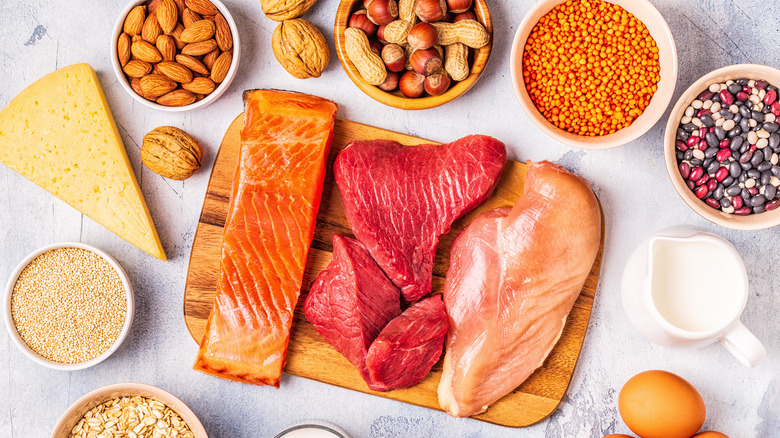When You Don't Eat Enough Protein, This Is What Happens To Your Blood Pressure
You can't get through a check-out line without catching sight of a protein bar at the grocery store or a gas station. Seemingly everywhere, the growing number of protein products available pushes the idea that we're severely lacking the essential nutrient. But Mayo Clinic experts say otherwise, stating that Americans are not only getting enough protein, but rather more than necessary. Yet there are still those of us who could stand to boost our protein intake in order to avoid potential health problems, including those related to our blood pressure.
We want to dedicate anywhere from 10% to 35% of our daily calories to protein. While protein needs will vary from one person to another, a general rule of thumb is that we want to be getting 200 to 700 of our daily calories out of a 2,000-calorie diet from protein sources, which equates to approximately 50 to 175 grams. What you may not know, however, is that we require more protein as we age. Once we turn 40, a person weighing approximately 165 pounds, for example, will want to be consuming 75 to 90 grams of protein daily to protect against developing a protein deficiency.
A lack of protein may increase hypertension risk
Severe cases of protein deficiency, such as those seen in some of the world's least developed countries (LDCs), can lead to skin deterioration, fatty liver disease, swelling, and more, reports Healthline. Yet a lack of protein doesn't have to be severe in order for a person to develop health problems. In a 2015 longitudinal study published in the American Journal of Hypertension, researchers set out to determine how protein intake impacted the systolic blood pressure (SBP) and diastolic blood pressure (DBP) readings of more than 1,300 adults and their subsequent risk for developing high blood pressure. None of the participants had any evidence of high blood pressure, heart issues, or diabetes at the start of the study.
The research findings showed that men and women who got their protein from plant and/or animal sources saw drops in both systolic and diastolic blood pressure measurements. Those who ate the greatest amounts of protein stood at a 40% lower risk of developing high blood pressure in the long run. Risk reduction jumped to 59% when high amounts of protein and fiber were both incorporated into one's diet. Such findings indicate that those lacking in protein may be more vulnerable to hypertension.
Get your protein from different sources to help lower blood pressure
For a long time, people have been wary of certain protein sources, like eggs or meat, due to their fat content. But study senior author Lynn Moore stated in a press release how these food items, amongst others, produced significant blood pressure-lowering results. "It was a little bit surprising. We expected to see a reduction associated with the protein—I was thinking in particular of eggs and dairy products—because of those known mechanisms. But I didn't expect to see as strong an effect as we did." Rather than sticking solely to meat or eggs, however, we want to diversify our protein sources to include regular consumption of nuts, yogurt, fish, or poultry, for example. Although promising, Moore points out that additional research is still needed in this area.
According to the World Health Organization (WHO), high blood pressure is a major contributing factor in early death rates around the globe. Our genetics, excess consumption of salty foods, and a sedentary lifestyle are just a few of the many different things that can raise our blood pressure. While treatment with medication may be required in some instances, eating a healthy diet, not smoking, and making time for weekly exercise can help lower blood pressure to healthy levels.



